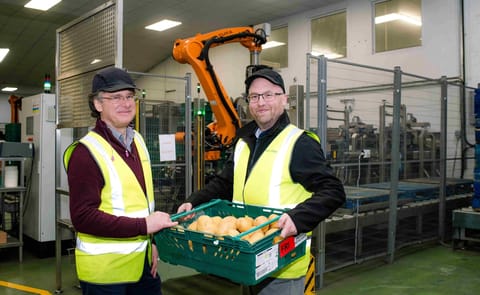Generational change within KPW
主标签
Generational change within Avebe Kartoffelstärkefabrik Prignitz/Wendland (KPW)

Every site of Royal Avebe has its own Human Resources challenges. This includes the Avebe Kartoffelstärkefabrik Prignitz/Wendland (KPW) sites in Germany. The relatively high average age of the staff creates capacity challenges for the future.
Manuela Kruse, Recruiter at KPW, is working hard with her colleagues on a generational change at the two locations. She talks about the personnel developments at the sites in Dallmin and Lüchow.
Manuela Kruse, Recruiter at KPW:
Manuela Kruse:
It depends very much on the position in question. We use the career portal on our website, regional networks and online job boards. Sometimes we still choose the old-fashioned way by placing a vacancy in regional newspapers or using headhunters.
Recently, we have recruited good employees who used to work for us as temporary workers. The internal campaign ‘colleague recruits colleague’, in which we gave away recruitment bonuses, was also successful.
Attractive employer
Manuela Kruse:
Manuela Kruse:
Manuela Kruse, Recruiter at KPW, is working hard with her colleagues on a generational change at the two locations. She talks about the personnel developments at the sites in Dallmin and Lüchow.
Manuela Kruse, Recruiter at KPW:
"There are currently almost 140 people working at KPW. Based on the current data, 31 of them will retire in the next ten years. The need for young workers will therefore only increase in the near future."Generational change
"I see this as our greatest challenge. But making and keeping our employees fit and healthy is also a challenge."
"Especially given the further raising of the retirement age. The project “SPP – Strategic Personnel Planning” has an important role here. For example, we offer training to our employees for several functions within production. Knowledge transfer between colleagues is also central."
"The average length of service at KPW is currently 17 years. The highest number of years of service within KPW currently stands at 46 years."
"The knowledge gained over the years is invaluable. To prevent the loss of knowledge and experience, we work with SPP to ensure a permanent transfer of knowledge."
Manuela Kruse:
"We see a clear generational change within KPW. Looking back over the past eleven years, KPW has moved from a generation of baby boomers that was very well represented at the time to an employee group that is much more multi-generational."Recruiting new employees
"And with the change of generations come different needs. The younger generations attach much more value to the total package of employment conditions."
"This means that there are higher expectations regarding flexible working, work-life balance, digitalisation and other benefits such as health at work. Shift work and weekend shifts are losing popularity with young applicants, as this does not fit in with their lifestyle."
It depends very much on the position in question. We use the career portal on our website, regional networks and online job boards. Sometimes we still choose the old-fashioned way by placing a vacancy in regional newspapers or using headhunters.
Recently, we have recruited good employees who used to work for us as temporary workers. The internal campaign ‘colleague recruits colleague’, in which we gave away recruitment bonuses, was also successful.
Attractive employer
Manuela Kruse:
"It is important to develop a corporate culture in which cooperation and trust are central, and there is room for employee input."Future
"Creating a good working atmosphere, offering a variety of tasks and focusing on the continuous transfer of knowledge and experience from long-serving employees to new employees would, I believe, be good steps towards increasing our attractiveness as an employer."
"We also need to take a close look at our current working hours models and, within our possibilities as a company, optimise the desired flexibility of working hours, work-life balance and our ageing employee group."
Manuela Kruse:
"Our challenge for the future is to fill crucial key positions with welltrained professionals promptly and in line with job requirements."
"It is about combining the different generations working for us into a team where youth and competence come together. And I’m happy to work on that!"
Like to receive news like this by email? Join and Subscribe!
Get the latest potato industry news straight to your WhatsApp. Join the PotatoPro WhatsApp Community!
精选企业
Sponsored Content
Sponsored Content
Sponsored Content
Sponsored Content









